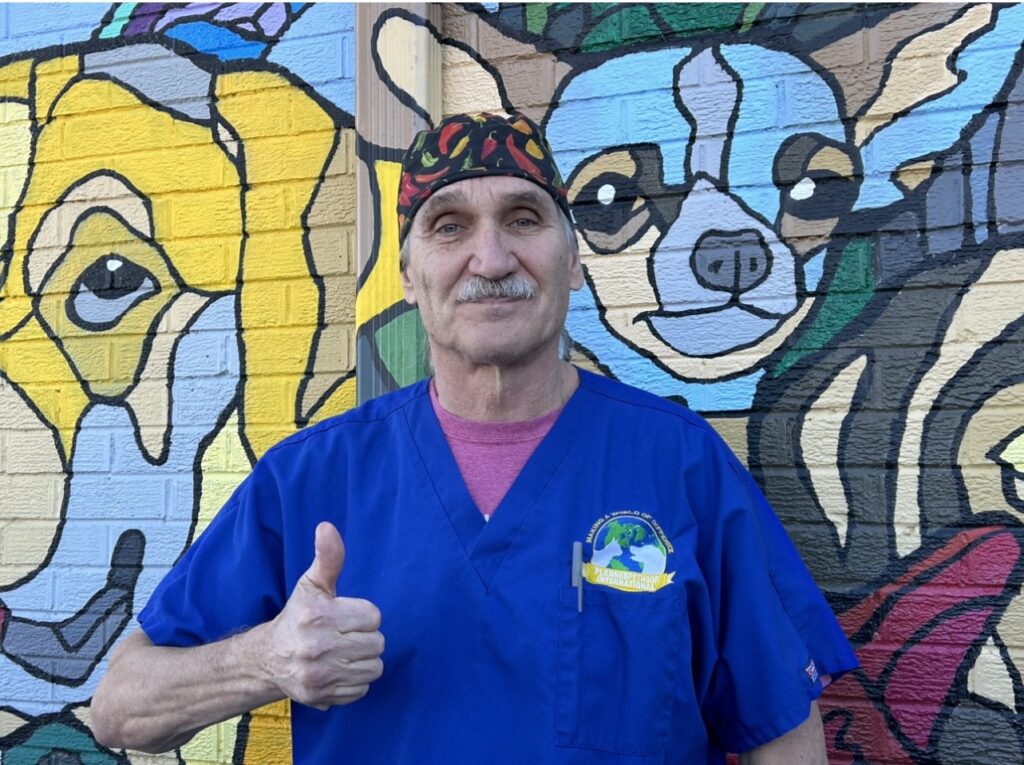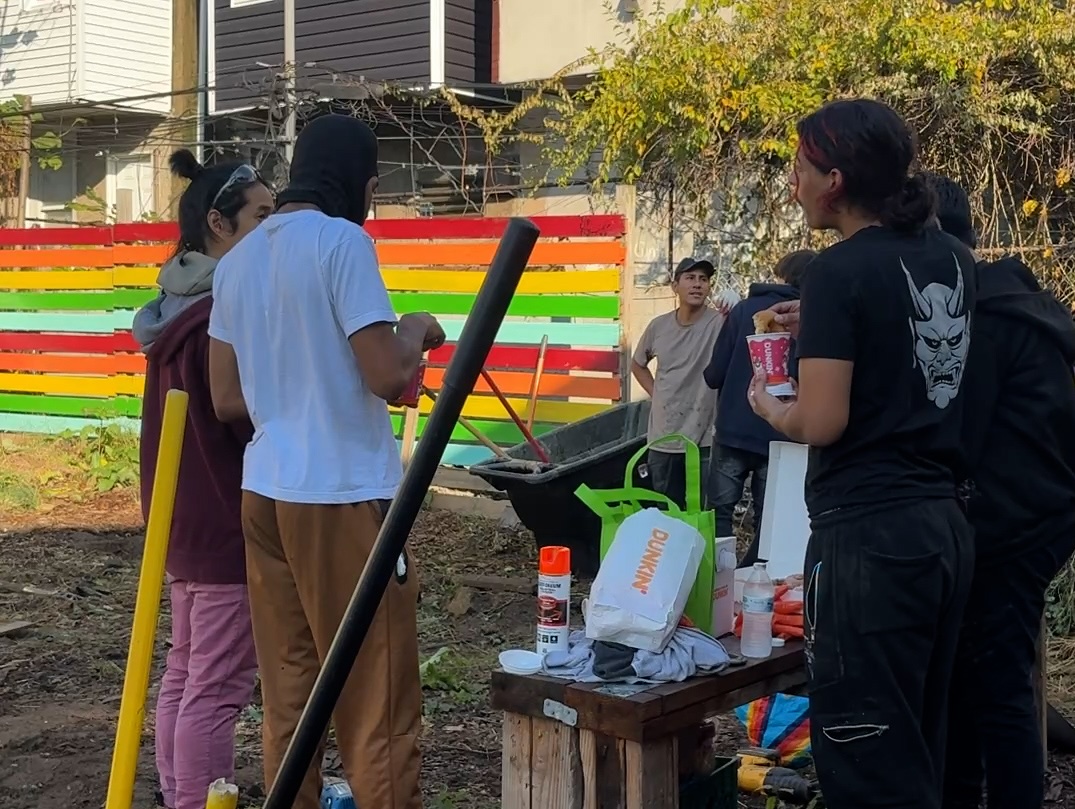(DENVER, CO) — The Planned Pethood Plus clinic is a lot bigger – and more chaotic – than it looks on TV. On a recent Monday, the many hallways were filled with cages and animals connected to vital machines, hums of rushing feet and animal barks can be heard. In the middle of it all is Dr. Jeff, stitching up an unconscious chihuahua after having used tweezers to remove a mass the size of a golf ball.
In its eighth Season on Discovery and other televised outlets, the Dr. Jeff: Rocky Mountain Vet series is set at the chaotic clinic and offsite in the Colorado country. Dr. Jeff and his wife, fellow vet Dr. Petra, work with other veterinarians to perform life-changing and in many cases, life-saving procedures. From exotic animals to our beloved domesticated pets, Dr. Jeff has helped them all. What you don’t see on TV is the crisis situation in animal care and a man who evolved to approach animal care in a decidedly different way.
The clinic operates in a constant state of chaos. Vets call out to each other about the status of their patients, post-op patients lay on the heated lower level to be closely monitored. Not to flinch, vets’ hands become bloody and masses are removed, only to expertly stitch up the area and move on. On the show, an episode focuses on two or three pets. Here, there are patients everywhere.
“[On the show it seems] like we had all this time for that one patient,” says Melody Obuobisa, Dr. Jeff’s daughter. “They don’t realize there’s 50 other patients in the hospital at the same time that we’re also taking care of.”
While the show can be graphic, one thing you won’t see is all the animals who are brought in because of abuse or neglect. According to Obubisa, the producers don’t want such negative storylines. Behind the scenes, however, that’s a lot of what they treat. “I think people would be kind of shocked if they just came in here,” says Obuobisa.
But Dr. Jeff wouldn’t have it any other way. He is dedicated to taking care of every animal he possibly can – and has been almost all his life.
“I can’t remember a time that I didn’t want to be a vet.” Dr. Jeff recounts as he reminisces about spending time at his grandparents’ farms as a child. He was exposed early in life to the dark side of agriculture, collecting eggs from wire huts with 10,000 birds and the chickens’ feet grown into the cages. Dr. Jeff says he was raised to believe that animals do not experience pain equal to that of humans. He had hunted and trapped animals since the age of six. Now, he opposes trapping and eats an almost entirely vegetarian diet. “In vet school, we found out that they all have the same neural receptors and neurotransmitters,” he says. Armed with experience and education, the onetime farm boy hunter-trapper evolved into a compassionate and ardent animal protector.
Raised in a military family, Dr. Jeff moved from Indiana to Guam to Montana to Florida. After studying animal science and anthropology in college, he earned his Master’s degree at Montana State in Parasitology and graduated from Colorado State University’s College of Veterinary Medicine. During his time in vet school, Dr. Jeff worked with animal control and witnessed impound seizure practices, whereby animals taken to shelters were then brought to back rooms and sold for research. Dr. Jeff worked as a junior investigator for the State of Colorado to help render these impound practices illegal on the state level.
For 29 years, Dr. Jeff coached cross-country running at an inner-city high school. He took the team on camping trips, and in-between outdoor activities kids would watch him provide vet services firsthand and had the opportunity to assist on the spay/neuter bus.
“Growing up where we did, you see kids struggling with disadvantage,” Matt Poundstone said, recalling a trip as Dr. Jeff’s former student to a local reservation. “Then you actually go see places on the reservation, and really see where those living conditions are – that was always a very big eye opener growing up.”
The Dr. Jeff: Rocky Mountain Vet TV series began on the spay/neuter bus, following Dr. Jeff into his first clinic. All the while, Dr. Jeff was teaching kids and running his business at a race-paced lifestyle that has continued to center around education. Dr. Jeff explains that the model for his clinic to operate at such a low cost is high volume, low income. Most veterinary hospitals perform an average of two to three surgeries a day, while his clinic performs an astounding 20 to 40 daily. Each of his client services is priced according to a sliding scale based on owner income, resulting in some owners receiving vet services for free.
“A lot of times in animal medicine, they recommend putting [the animals] to sleep if you can’t afford the surgery – even if it’s something that the animal could survive and live a happy, normal life, ” Obuobisa laments. Such economic euthanasia doesn’t sit right with Dr. Jeff and his team, advocates of animal survival regardless of the net worth of their owners.
Dr. Jeff notes that many veterinarians decline work for liability reasons, feeling uncertain about how to treat the animal or fearing the loss of an aged or ill pet. For this reason, animals are constantly turned over to offices like Dr. Jeff’s. Ten years into his career, Dr. Jeff’s first heart surgery was on a puppy with a unique illness, where the esophagus swelled from scar tissue resulting in a lack of oxygen or ability to eat. Tasked with not having done it before, he looked at his textbooks that detailed each step, followed the steps, and it was a success. The puppy went on to live for many years.
“That’s something I’ve always admired about him .. he’ll take risks, he doesn’t worry about embarrassment,” adds Poundstone, Dr. Jeff’s former track student.
Having the clinic on TV for the past eight years has both helped and hurt the work of Dr. Jeff. He explains that the show led to clients expecting low-cost care even if they do not meet low-income thresholds. Filming has also distracted from the work, wherein they would be asked to redo shots, or specific veterinarians spent a day away shooting, causing a backlog of work at the clinic. On the positive side, the show has increased awareness of animal care, and of the animal nonprofit resulting in an increase in donations, including valuable estate planning bequests. These bequests help cover employee and clinic costs, fund educational campaigns, and subsidize costs in other towns for animal care. Dr. Jeff’s clinic collaborates with six vet schools, providing hands-on comprehensive education. He trains students so that more clinics may provide services beyond the minimal spay, neuter, and vaccination shots.
After 30 years of animal service and nearing retirement, Dr. Jeff and Dr. Petra have bought a farm, and are constructing a state-of-the-art surgical training center in Conifer, Colorado to carry on his life’s work.


